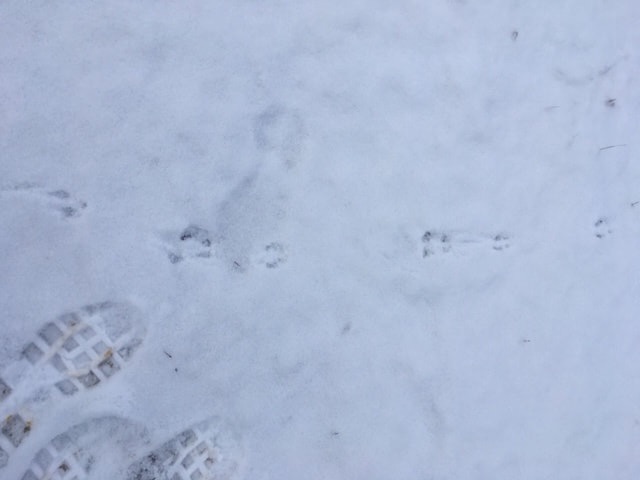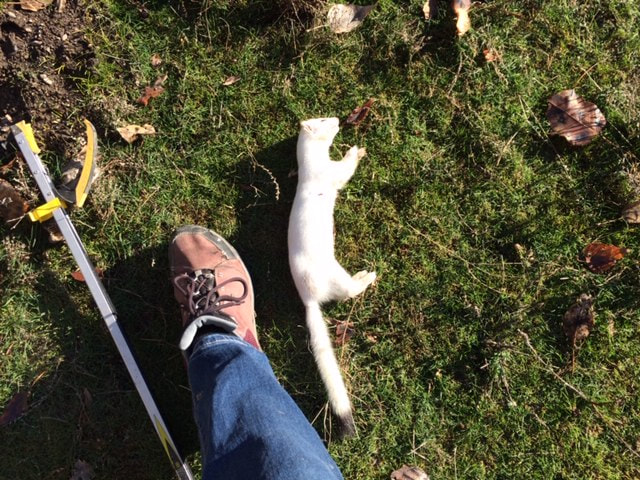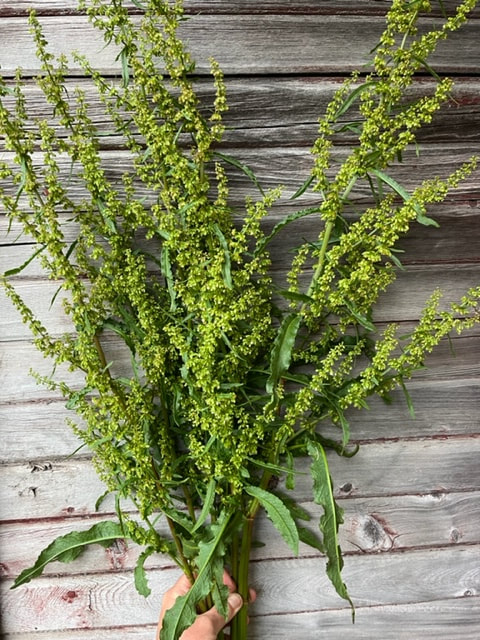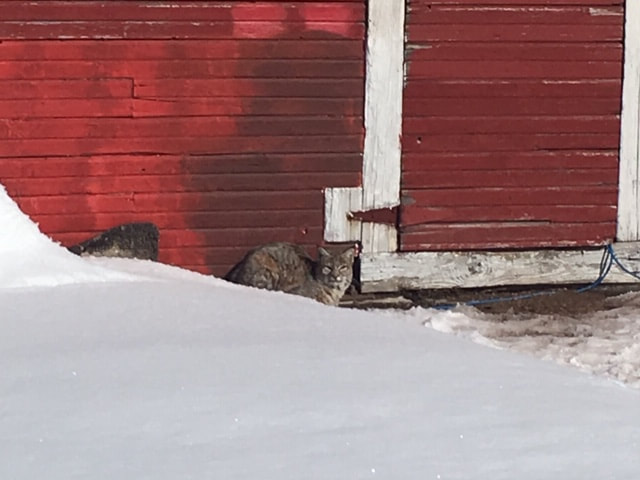|
Keeping chickens and other poultry in winter isn’t difficult but it does require some preparation as repairing or setting up fences in 3ft deep snow or scrambling with extension cords and heat lamps to prevent frost bite in sub zero conditions isn’t easy. Each of the next 6 weeks, I’ll focus on one aspect of caring for chickens and ducks in winter The main things to prepare for are:
Managing a change or possible increase in type and number of predatorsWinter can be harsh for all animals, local wildlife included. Food is harder to find and it’s always cold. And because we feed and supplementally heat our coops it means more than just the chickens and ducks are happy to make use of both and sometimes other animals are looking not for chicken feed but chicken dinner. Below is my top tips and methods for keeping the hens safe from all the other animals that come around during winter. Rodent (mice & wood rats)These may be the smallest but they can be the most pernicious of predators to deal with when raising poultry. They are the smallest and thus the hardest to keep out. They eat the hens’ food, poop & pee all over the place (well so do the hens, but they live here on purpose), chew through stuff, and cause general mayhem. The 3 best ways to deal with them are:
Rats & mice are predators? what!? Yep. They probably won’t do too much harm to most adult birds, but they can serious injure or kill chicks and young ones. On the flip side, adult birds may also eat them so they aren’t the worst out there for outright bird deaths. Weasels (mink & ermine)These are the ones I’ve lost the most birds to, mainly mink. And why are weasels so bad? Bloodlust. Once they kill, they can kill all of the flock. Sometimes, and more commonly in ermine & mink, they go crazy once they taste that blood and go through the entire flock and kill as many as they can get ahold of, probably all if it is at night and the birds are asleep. If they are around how do I manage them? Don’t try to eradicate them. You won’t be able to and, really f***ing important is that they eat rats and mice! They are the most common and prevalent pest/predator and the mink/ermine (like hawks & owls) eat them! They can be our friends and allies!!! The key to letting them stay but keep them away from your hens? Let their prey stay around. This is the reason why I only start removing rodents if they get out of hand. When they are around the predators prefer them to chickens & ducks! Yep! Believe me! The only time I’ve had a problem is during Deep Cold & Deep Snow (the time in mid-late winter where there has been 3 feet of snow for weeks and the temps go below and stay under the single digits). This is when their prey stays cozy in their holes with their caches of nuts & seeds so they can’t get to them, so they go after the birds. This is when my .22 comes out to stay ready by the door in case I see them trying (or in) the coops and I start spreading the cayenne everywhere. Cayenne? wtf? yesireybob! Cayenne is so useful as a deterrent for any mammal (mink, ermine, lions, bobcats, wolves, coyotes, even bears). It’s almost the same stuff in the bear spray cans but cheaper and easier to use. [FYI bear spray is a deterrent but not in the same way I use the cayenne. Bear spray stops animals from attacking when you spray it on them. The cayenne is a passive deterrent.] Get a big jar of cayenne powder and sprinkle a big, solid, line around the entire coop and run, barn, etc. If a predator comes sniffing around they will get a nose or paw full of cayenne and it is a huge irritant for their sinuses and mucus membranes (hey bear spray stop charging grizzlies in their tracks!). Not only do they go away but they learn to stay away. We can all live together! Oh yeah, and chickens & ducks can’t taste/smell capsacin (the active ingredient in cayenne and other spicy peppers) so it doesn’t bother them at all! so perfect! (Note: it will irritate pets, like your cute kitties and doggies, so keep them away if you use it. and keep it off of you!) And remember: every new snowfall (or melt) means you needs to refresh the line! Eagles, Hawks, & Owls (ravens & crows)The big guys of the sky! So beautiful! So majestic! What you don’t have eagles all over the place! guess you don’t live in Eagle City like I do. Drive along the highways in winter and you’ll see dozens by the side of the road feasting on the deer that succumb to traffic. They can also be a problem for little (& big) chickies! The best way to minimize the fright from them is to give your birds cover. It can be a roof, screened cover, or just lots of little bushes or shrubs. A tall cover is not so good since those agile hawks can fly under it, so go for low, tight shrub and plant cover. Large overgrown shrubs are great! My girls have ducked under the huge lilac in the lawn so many times when they’ve seen a shadow in the sky. So make sure the cover is just a few feet away, like max 5-10 feet, from anywhere they are in the field. That way they can duck (or chicken, hehe) and cover any time they feel the need! Also, make other areas, away from your birds, super great for those owls, hawks, and eagles. Put posts at the far end of the field. Hawks love to sit on em and look for those rodents and small animals in the field. And you want them to eats those rodents! Like the mink & ermine, they are your special friends! 2 things I do that most ppl think are weird: - I praise my girls when they get nervous/cautious/or run under cover when they see a ‘sky shadow’. Even if it is a turkey vulture, plane, of just me flapping the laundry I tell them ‘good job’, ‘way to be safe’ anytime they react. - I say hello & thank you to the ravens & crows that live nearby. They can be a predator for young pullets and chicks, but you should be keeping those safe anyways. More importantly, Ravens & Crows don’t like hawks or eagles hanging around near their nests. They chase them away. I have a group of Ravens that nest about ½ mile up the valley from me and I know I would have more hawk problems if they weren’t there (mainly because in early spring before they nest and late fall when they are done is when I have the ‘hawk trouble’). So I thank them and welcome them. Hey they were here first and doing a great job to help protect my girls! Thanks Ravens! The Big Guys (Wolves, Lions, Bobcats, Coyotes, skunks)The scary ones. For these the best plan is a good defense. Build the coops sturdy enough to withstand an assault overnight or while your away and when they are around, spread that cayenne. I’ve had a bobcat spend three nights poking around the coops & runs looking for an in and finding no whole in that armor. SO it decided to hang around the barn and hunt the rodents. Super cool, but after a week went by I kinda wanted it to move on and wasn’t sure how to do that politely. The next day that problem was solved when a lion moved in, beating it’s paws bloody against the front wire on one run before I scared it off. That run was damaged, but not breached! I renewed my cayenne barrier and kept a close watch (and kept my bear spray and 6” knife close by at all times). They stayed away the rest of that winter and I learned that my coops can stand up against the onslaught. So don’t be afraid to build those coops strong! Skunks: they are cyuuute! the cutest! but stinky and deadly to hens so don’t discount them! (bears)The big guns. I’m not sure you can functionally build anything strong enough to keep them out entirely. They are stronger than you think and can just rip off a truck door like we open a candy bar. Thankfully, they aren’t mostly looking to eat the birds, but will, and usually are looking for that yummy grainy feed! I consider them like giant, super dangerous rodents, and keep the feed away from them. If you live somewhere with problem black bears that are used to people. Good luck! Just keep anything edible, including your trash out of their reach. That’s the basics! (and more!)
And no matter what kind of livestock you have or predators you deal with, nothing can substitute for time spent with your animals. Observe them. Listen to them. See the patterns in their behavior and learn it. It can show you what they are wary of and what they need from you to make their life the happiest and most comfortable you can make it! You’ll also learn to know the sounds the hens & roosters make whether the predator is airborn or on land. They have different warning calls for that. If you have ducks and you see them all staring at a blank spot in the sky, know that it isn’t blank. There might be the tiniest, most distant speck, but they see it and are watching it, so learn to watch them. They are your masters.
0 Comments
Leave a Reply. |
AuthorI'm Farmer Megan with a life full of cackles, clucks, quacks, weeds, crazy kitten, and one tiny, senior, blind dog. Archives
May 2024
Categories
All
|




 RSS Feed
RSS Feed